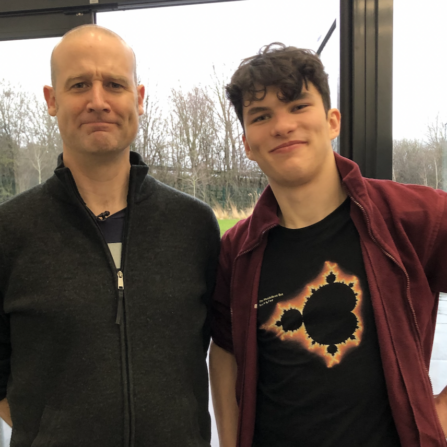
Nick C.
MMath, MASt, DPhilWhich university are you studying at?
Durham University, University of Cambridge, University of Oxford.
What subjects and qualifications did you take at school or college (e.g. A Levels, IB, BTECs, EPQ)?
A Level Maths, Further Maths, Physics, Chemistry.
Why did you decide to pursue this degree at university?
Maths is one of the most fundamental and broad subjects there is, spanning from the purest ideals of intrinsic properties of algebraic structures, geometric objects like surfaces and knots, or number theoretical truths concerning the distribution of primes, to heavily applied areas often requiring use of computers to solve real world problems such as modelling financial data, fluid flows, or in mathematical biology, or the magnetic field of the Sun, to more theoretical concepts in quantum physics or general relativity, to statistical methods used to study data and ‘predict the future’, or even to areas where the line is blurred, such as in probability, combinatorics, the study of distributions, differential equations, or of chaotic systems, or even to foundational truths in mathematical logic or category theory. I always enjoyed visualising objects, finding patterns, and finding patterns, but was also attracted by the level of connection and interweaving between all of the disciplines, not only those mentioned above.
What does an average day or week at university look like for you (e.g. lectures, practicals, independent study, other interests)?
Usually two to three lectures or so a day during undergrad, followed by self-directed work revisiting lecture notes and attempting homework problems (sometimes with friends), with classes going through those problems and sessions to solve those problems in small groups with a supervisor thrown in there as well. Now my days are usually reading books and papers, going to less rigidly timetabled lectures given by visiting academics on their research areas that I’m interested in or think may be useful to have a gist of, (and catching up on the areas of maths I missed throughout my undergrad – ie. algebraic geometry/functional analysis!). Two or three evenings/afternoons I try to play squash in college, go bouldering at a local climbing centre, or hopefully go for a run (but this is often wishful thinking!). Going for long walks and exploring the university city was a common activity beyond this!
What aspect of your course do you most enjoy?
I love finding out about new cool facts and concepts, especially if they’re unintuitive or can be explained simply in some context! For example, by the Borsuk-Ulam theorem, there must always be two opposite (antipodal) points on Earth with the same temperature and wind speed – in fact, as long as you choose two continuous scalar quantities, you can make this whatever you want (for example, air pressure and number of sunlight hours). I also enjoy visualising whatever I am describing – currently I find myself often thinking about how a liquid would flow over a (hollow) doughnut turned on its side – somehow from this, you can mathematically recover the data that the doughnut has a hole in the middle! Overall, I just enjoy expanding my knowledge of mathematics and its many fundamental truths as a whole, and finding links between different areas when studying them.
What do you find most challenging about your degree?
Often keeping up with the work load and anxiety with exams. It can be hard to find enough hours in the day to do everything you want to do, and it can be hard to weigh up what will benefit you the most – will it be helpful for me to continue struggling with a problem for another hour, or should I go out and meet a friend, go for a run, relax and watch the next episode of that series, or (most likely) get an early night’s sleep. (Keeping a consistent and healthy sleep schedule also goes out the window for some period of time!)
What are your aspirations after your degree?
Research! I would like to discover at least one new fact about maths that no one else has discovered. Even better, I would like to have some new view of an area of maths which changes our perspective and improves our understanding of it – historically this has been the case by applying ideas from physics and the physical world around us, so hopefully I can go via that route! More wholly, I’d like to either proceed with research and academia, or apply some of my softer skills and knowhow to some real-world problems, not to just make lots of money for already wealthy companies, but to hopefully solve some issue or improve a facet of life that will help people or help in the way to making scientific progress in another field.
What would be your top piece of advice for anyone wanting to study mathematics?
Above all else, do what you love and what you enjoy – just because its hard doesn’t mean that it isn’t worthwhile or enjoyable in its own way. In the specific case of maths, it’s such a broad subject that there’s lots of diversity to find something that you like. Key concepts (and even more direct module options) useful for physics, chemistry, quantitative biology, economics, data science, machine learning etc. are often widespread throughout undergraduate study, though definitely targeted from a ‘less applied’, usually more theoretical point of view.





Comments